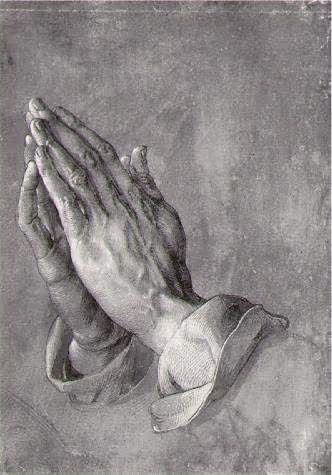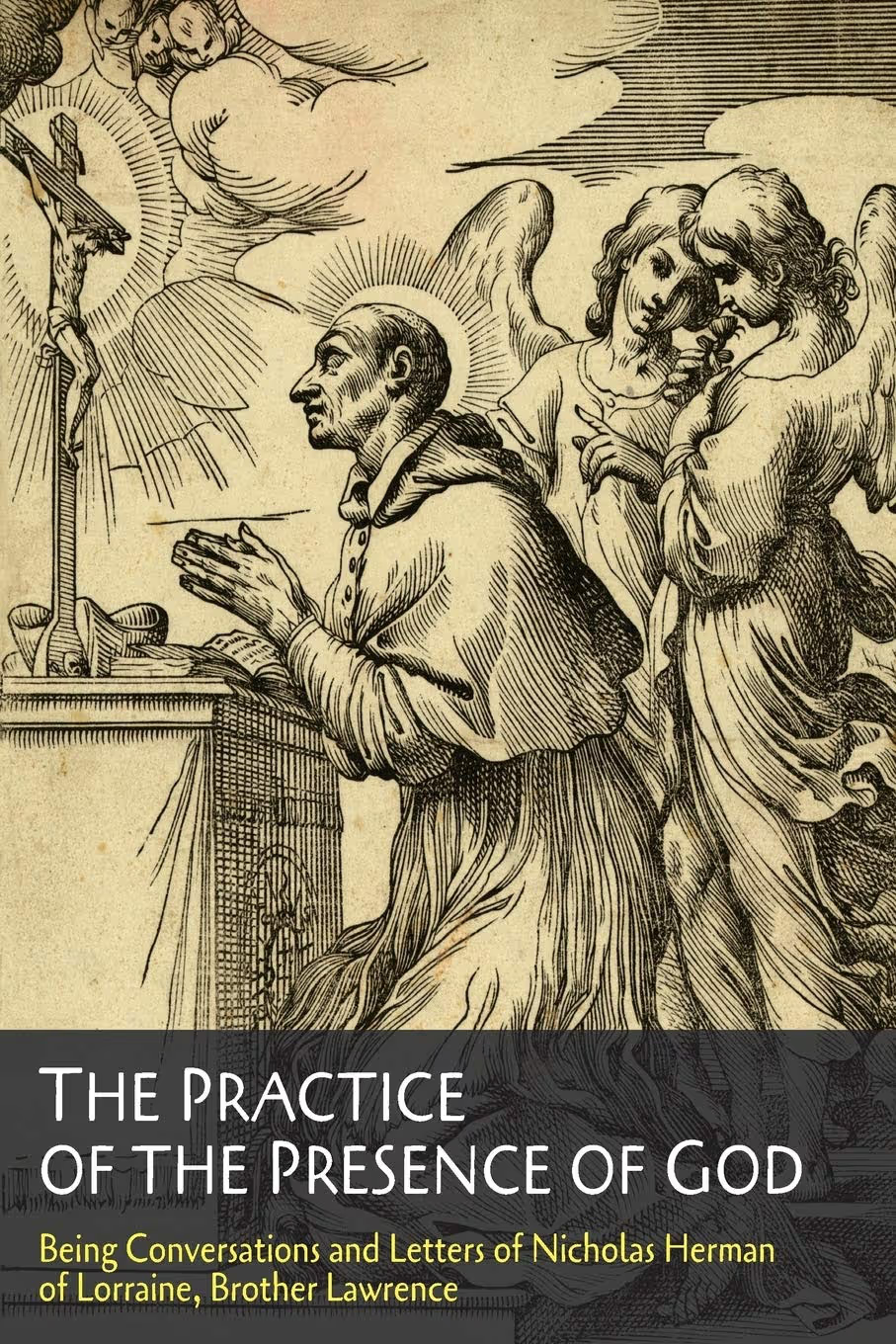November 2, 2025
.avif)
On the first Sunday of the month, we’re asking members of our Rolling Ridge community to share how their spiritual lives were transformed by the great heroes of faith. (Read the series introduction here.) As we wrap up this series, we end with a look at Brother Lawrence, a spiritual hero of Alan Dillingham. Alan is a spiritual friend of Rolling Ridge, a spiritual writer, life-long learner, world traveler, and certified pilgrim who has walked the Camino de Santiago.
by Alan Dillingham
“The practice of the presence of God contains the whole spiritual life.”
These words come from The Practice of the Presence of God, a short collection of conversations and letters from a 17th century French monastic known as Brother Lawrence. I first heard about Brother Lawrence a few years ago from a spiritual director at Rolling Ridge. But I only really made his acquaintance earlier this year, when I sat down to listen to an unabridged audio edition of this book, which only ran about an hour and forty-five minutes long.
The idea of practice is what really drew me to Brother Lawrence. Relatively late in life, I discovered that I suffer from ADHD, attention deficit disorder. I had a tendency to wander all over the map, affecting my ability to focus intellectually or spiritually. I seemed to be spending a lot of my time spinning my wheels or reinventing them. Ned Hallowell, a leading expert on ADHD has noted that having ADHD is “like having a Ferrari engine for a brain, but with bicycle brakes.” According to Hallowell, habits, structures, rituals and practices can help provide ADHD sufferers the “brakes” they need to focus more effectively.
What Brother Lawrence called the practice of the presence of God rested on three simple pillars. It began with faith; faith that God was always and everywhere present in creation. The next step was prayer, which for him simply meant turning his attention to God with a completely open heart. After that, he endeavored to make this type of prayer a habit, a practice of leaving himself continually open to God in conversation.
Brother Lawrence’s faith was strengthened by a singular favor or realization that God granted him at the young age of eighteen. While gazing at a lifeless tree in winter, he was struck by the realization that the tree would soon blossom again in the spring. This realization engendered in him a deep awareness of God’s providence and power that matured into a faith that never left him and would direct his future course in life.
Faith was simple for Brother Lawrence. It was the realization that God existed, was all-loving and present everywhere, at all times. He often referred to God as “the Father of mercies” who receives even the smallest act of love from his creatures with great delight. Faith was, first of all, a gift from God to his creatures, and secondly an act of the will on their part, not the intellect. It was a continual trust, love and resignation of the individual’s will to God’s love, and a decision to return that love. The existence of God was not the result of some abstract proof, but of God’s self-revelation. Brother Lawrence never argued for the existence of God; he simply accepted it. For Brother Lawrence, it was the light of faith that guided his thinking, and not the other way around. The light of faith assured him of God’s presence even when he could not feel it. It was faith above all that Brother Lawrence considered to be the Spirit of the Church.
In Brother Lawrence’s thinking, faith led naturally to prayer. His prayer, like his faith, was simple. Brother Lawrence didn't offer complex steps, formulas, or strict disciplines. His rule was simple: continually turn your heart toward God, speak with Him simply and lovingly, and do all things for His sake. He wrote that God “does not ask much of us — merely a thought of Him from time to time, a little act of adoration, sometimes to ask His grace, sometimes to offer Him your sufferings.”

The beauty of Brother Lawrence’s approach was that it required no specialized knowledge, education, apprenticeship or training. No rigorous asceticism, long hours of formal prayer, or complex theological contemplation were needed either. No elaborate system or technique. His “rule” could be practiced by anyone, regardless of education, status, or religious training. It made the spiritual life something available to the ordinary person, even in the busiest life. He held that anyone, regardless of station or learning, could live in constant conversation with God.
He came by this type of prayer almost by accident. In the monastery he had tried to absorb complex practices, methods and approaches, but he confessed they only left him confused, distracted, distant and cold. He opted for what he considered to be the most direct route to God. The fasting, silence, and liturgical prayer of the monastery he considered as only means to an end, and that many in the monastery failed to achieve holiness by confusing the means for the end.
To be most effective, Brother Lawrence insisted, prayer had to be a constant, habitual practice of leaving himself continually open to God in conversation. He tried to keep his mind ever focused on the holy presence of God. “We must recognize God as intimately present with us,” he wrote, “and address ourselves to Him every moment.” Every act became an act of resignation — a yielding to divine love — until faith itself became the rhythm of his life: simple, constant, and filled with the quiet joy of God’s continual presence. Brother Lawrence made the love of God the end of all his actions, focusing on doing little things with great love. He encouraged others to think of God often, and not to leave Him alone or neglected. While many spiritual paths emphasized scheduled devotions, Brother Lawrence practiced a continual, inward dialogue with God throughout the day. Whether cooking, cleaning, or walking, he turned his attention quietly and lovingly toward God.
Making prayer a practice requires persistence and a great deal of humility. His focus was on the love of God and not his own perfection. Brother Lawrence dealt with his faults and sins with remarkable humility, simplicity, and trust in God’s mercy. He relied on God, not himself. Brother Lawrence knew he was weak and prone to failure, and he didn’t pretend otherwise. His trust was in God’s strength, not his own efforts. This kept him from pride when he succeeded and from despair when he failed. “We can do nothing without God, and we must not be troubled when we see our weakness.”
Unlike approaches that emphasize guilt or self-punishment, he believed that the best way to respond to failure was with honest acknowledgment and immediate return to God. He did not dwell on guilt. Bodily mortifications and penances he considered useless if they didn’t bring us closer to the presence of God. He taught that when he committed a fault or sinned, he would acknowledge it before God plainly and humbly—without excuse, without drama, and without being surprised by his weakness. Then he would move on, trusting that God had forgiven him. “I simply confess my faults to God, and I ask Him for forgiveness, and I go on with peace.” He refused to be discouraged.
He believed that discouragement after sin was a greater danger than the sin itself, because it distracted the soul from God’s grace. The moment he noticed he had failed, he turned back to God—not with shame, but with confidence in divine love. “I am not surprised that I fall, but I am always surprised at how quickly God raises me up again.”
Brother Lawrence believed the fruits of the practice of the presence of God were both transformational and deeply spiritual, touching every aspect of life. He emphasized that as one consistently turned their attention toward God, certain spiritual benefits and graces would naturally follow. By living in constant awareness of God’s presence, Brother Lawrence found that his heart was filled with a peace beyond understanding, held in the bosom of God. This peace wasn't dependent on external circumstances but was a result of constant communion with God. "The more we are united to God, the more we are at peace.:
When a person practices the presence of God, Brother Lawrence believed that they would begin to experience joy—not just in moments of prayer or spiritual highs, but in every task, even mundane or challenging ones. This joy arises from the deep sense of God’s closeness and love.
When a person practices the presence of God, Brother Lawrence believed that they would begin to experience joy—not just in moments of prayer or spiritual highs, but in every task, even mundane or challenging ones. This joy arises from the deep sense of God’s closeness and love. "When we do everything for the love of God, we find joy and contentment in all things."
Living with a continual awareness of God allows one to release anxiety and worry, trusting in God’s providence. Brother Lawrence noted that when he felt overwhelmed by tasks or responsibilities, remembering God’s presence calmed his spirit and gave him clarity. "We should not be surprised if we fail sometimes, for we will always begin again, and God will continue to be merciful."
Brother Lawrence’s method, rooted in love for God, inevitably spills over into love for others. When someone practices God’s presence in all things, they develop a greater compassion and kindness toward people, seeing them through the eyes of God’s love. "If we have a love for God, we will also have a love for others."
Ultimately, the greatest fruit of practicing the presence of God is a closer union with Him, where one’s relationship with God becomes more intimate, continuous, and natural. This ongoing, silent conversation leads to spiritual transformation and fulfillment.
Brother Lawrence has become a good companion for me on my spiritual journey. Living with ADHD, I have often felt as though I am circling the same ground, full of movement but lacking direction. The practice of continually and quietly turning my attention to God, who is always there, with a simple and open heart has become a touchstone for my own restless mind. Brother Lawrence has shown me that even circling can be holy, if each turn brings me back to God.

The time of business does not with me differ from the time of prayer; and in the noise and clatter of my kitchen, while several persons are at the same time calling for different things, I possess God in as great tranquility as if I were upon my knees at the Blessed Sacrament. I worship Him the oftenest I could, keeping my mind in His holy presence and recalling it as often as I found it wandered from Him.
― Brother Lawrence in The Practice of the Presence of God
